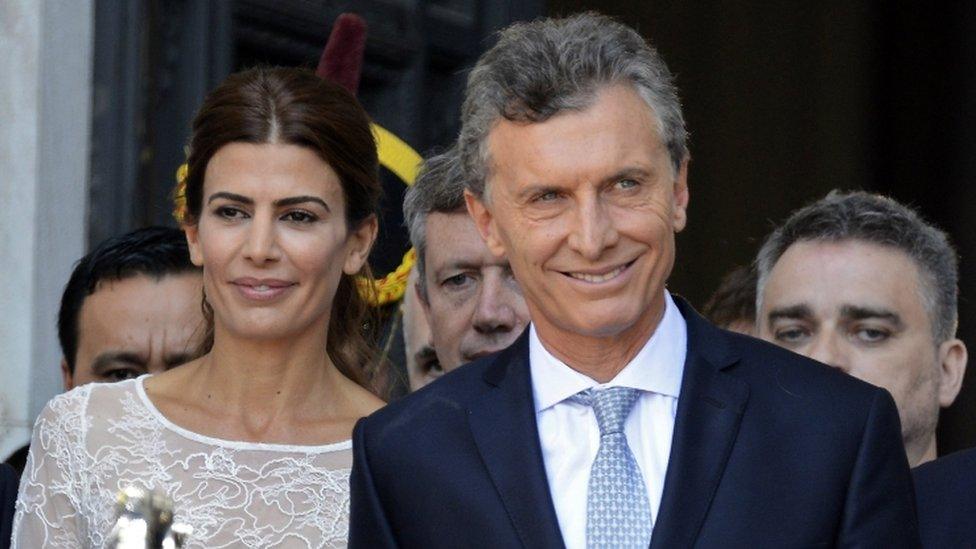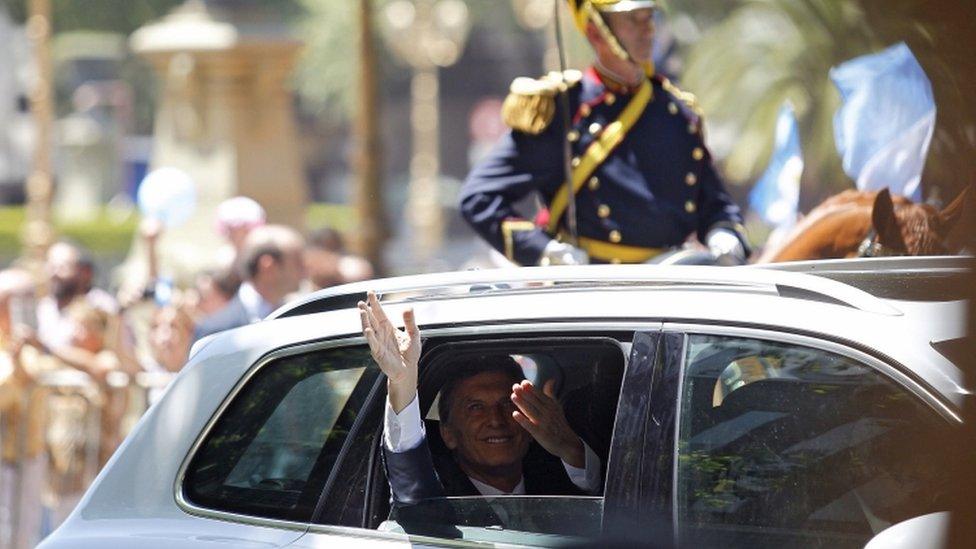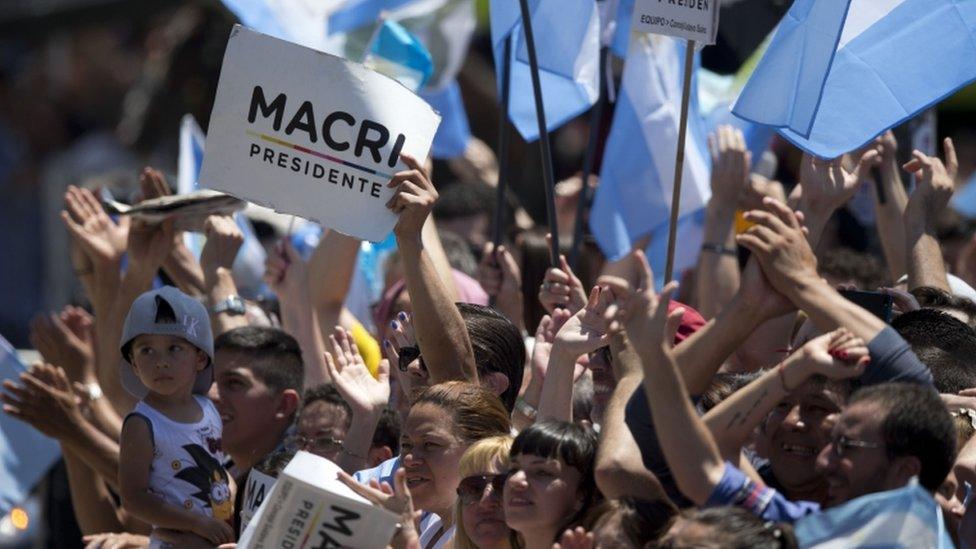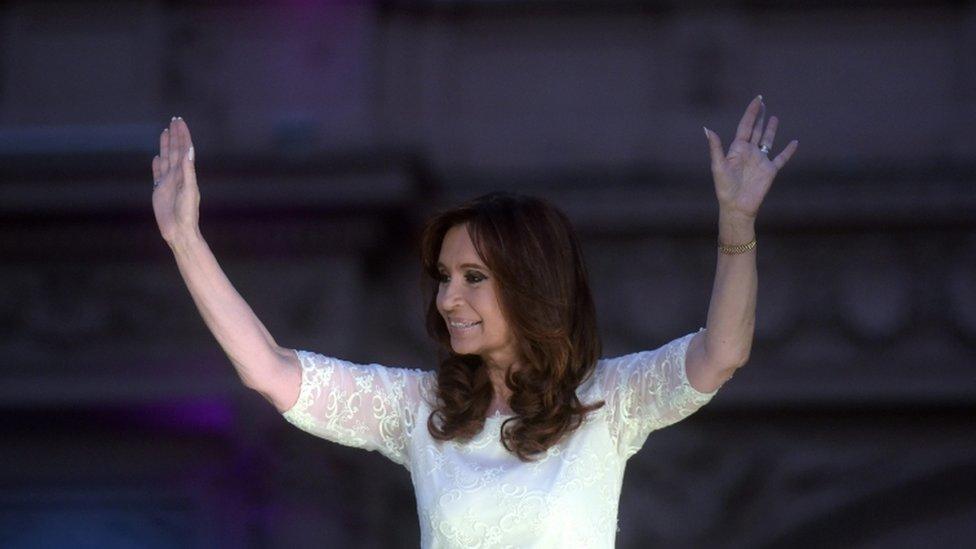Mauricio Macri: Argentina's new president vows to unite nation
- Published
Rousing applause followed the swearing in of Mauricio Macri as the new president
Mauricio Macri has been sworn in as Argentina's president, vowing to unite the nation and revive the economy.
The centre-right Mr Macri took the oath of office in Congress but his inauguration was boycotted by his predecessor, Cristina Fernandez de Kirchner, in a row over the venue.
In his inaugural speech, Mr Macri vowed to tackle corruption, poverty and drug trafficking.
He also pledged "team work" and an end to confrontation in politics.
Mr Macri, 56, told Congress: "As president I want to be a citizen who can communicate with all Argentines.
"Politics for me is not a competition to see who's got the bigger ego. It's working together for the good of the people.
"Today a dream is being achieved," he said.
Late on Wednesday, Ms Fernandez had bid farewell to supporters in an emotional speech, urging people to take to the streets if they felt betrayed by the new centre-right government.

President Mauricio Macri with First Lady Juliana Awada

Mr Macri vowed to tackle poverty, corruption and drug trafficking

Thousands lined the streets for Mr Macri's parade to Congress

On Wednesday, Ms Fernandez urged people to take to the streets if they felt betrayed by the new government
This is the first time since the end of the military dictatorship in 1983 that a president has not attended the inauguration of a successor.
Mr Macri triumphed in last month's election run-off, beating Ms Fernandez's chosen successor, Daniel Scioli.
Mr Macri has promised to move from a largely state-controlled economy under the leftist Ms Fernandez to one that is more free market-orientated, easing trade and currency controls.
He has also promised to improve relations with the US.
In his speech in Congress he said: "We've got to take confrontation out of the centre of politics. With fighting no-one wins, with dialogue, everyone wins.
"A new time is coming, a time of dialogue, a time of teamwork."
He said those who had voted for him wanted three goals - zero poverty, an end to drug trafficking and the unity of all Argentines.

The economic problems
High inflation - official figures suggest 15%, but independent analysts put it at nearly 25%
Slump in commodity prices, particularly grains
Dwindling foreign currency reserves
Default on debts linked to lawsuit with US hedge funds
Overvalued peso and restrictions on buying US$

To applause, he said he wanted a judiciary cleaned of its political affiliations.
Marta Gabriela Michetti was sworn in as vice-president.
The Fernandez handover and other awkward transfers of power
Mr Macri then travelled to the presidential palace to receive the sash and baton of office.
Ms Fernandez had insisted that the handover of the symbols of office should also take place in Congress, where her party holds a majority of seats.
She argued this was a tradition established by her and her late husband and predecessor in office, Nestor Kirchner.

The BBC's Ignacio de los Reyes on why the power handover has been marred by a big squabble
'Best and worst' of Fernandez - media round-up
The Buenos Aires Herald says Ms Fernandez's last day showed her "at both her best and her worst" with a "display of petty political mischief" but with "a grip on the popular imagination". She is "leaving not with nostalgia but with a rallying cry", it concludes.
La Prensa describes Ms Fernandez's failure to manage the handover ceremony as "a loss without precedents" and "a bitter lesson learned too late", adding that new president is now firmly "in control".
Left-wing newspaper Pagina 12 is more sympathetic, showing images of the huge crowds of supporters gathered in the Plaza de Mayo, along with the headline: "The Hug."
In Brazil, right-wing magazine Veja writes of "the follies of Cristina Kirchner" while Chile's El Mercurio says Mr Macri is taking power "surrounded by controversy".

Mr Macri argued that according to presidential protocol, the handover should be held in the palace, as it was before 2003.
Local media reported that Mr Macri's decision was probably driven not just by tradition but also by a concern that followers of Ms Fernandez could disrupt the ceremony in Congress.
After Ms Fernandez declined to attend the ceremonies, Mr Macri's party sought a court injunction affirming that her term ended at midnight on Wednesday.
Ms Fernandez told her supporters on Wednesday evening: "I can't speak long because at midnight I turn into a pumpkin."